Canada Home Security Camera Privacy Rules
This post contains affiliate links. As an Amazon Associate, we earn from qualifying purchases.
When using home security cameras in Canada, it is crucial to adhere to privacy laws such as PIPEDA. Always ensure that your cameras only capture footage of your property and not your neighbors’ yards or private areas. It is also important to use clear signage to inform anyone nearby about the surveillance. While homeowners do not require formal consent to record, they must secure any recorded footage. By understanding these rules, you can effectively protect your home while respecting the rights of others. Further details and guidelines will be provided for those interested in a more comprehensive understanding.
Essential Facts in 30 Seconds
- Obtain clear consent before recording audio, as required by Canadian law to protect individual privacy rights.
- Ensure security cameras capture only images within your property lines to respect neighboring privacy.
- Display signage prominently to inform visitors and residents about the presence of surveillance cameras.
- Avoid placing cameras in sensitive areas such as bathrooms and bedrooms to uphold privacy expectations.
- Implement secure storage practices for recorded footage to prevent unauthorized access and comply with privacy laws.
Overview of Canadian Privacy Laws
Canadian privacy laws play an important role in protecting personal information. The main law is the Personal Information Protection and Electronic Documents Act (PIPEDA). This law tells private organizations how to collect, use, and share personal information. Consent is a key part of PIPEDA. You must give clear consent before organizations can use your data.
Several provinces have their own privacy laws, too. Alberta has the Personal Information Protection Act (PIPA), and Quebec has the Private Sector Act. These laws help strengthen your privacy rights. They also focus on transparency and good management of data. For example, Quebec’s Law 25 has stricter rules about consent and requires notifications for data breaches. Recently, federal privacy law has been identified as being in urgent need of retooling, highlighting the importance of staying informed.
Understanding these privacy laws helps you make smart choices about your personal information. They ensure your rights are protected at both the federal and provincial levels. Staying informed is your best defense against misuse of your data.
Legal Restrictions on Camera Placement
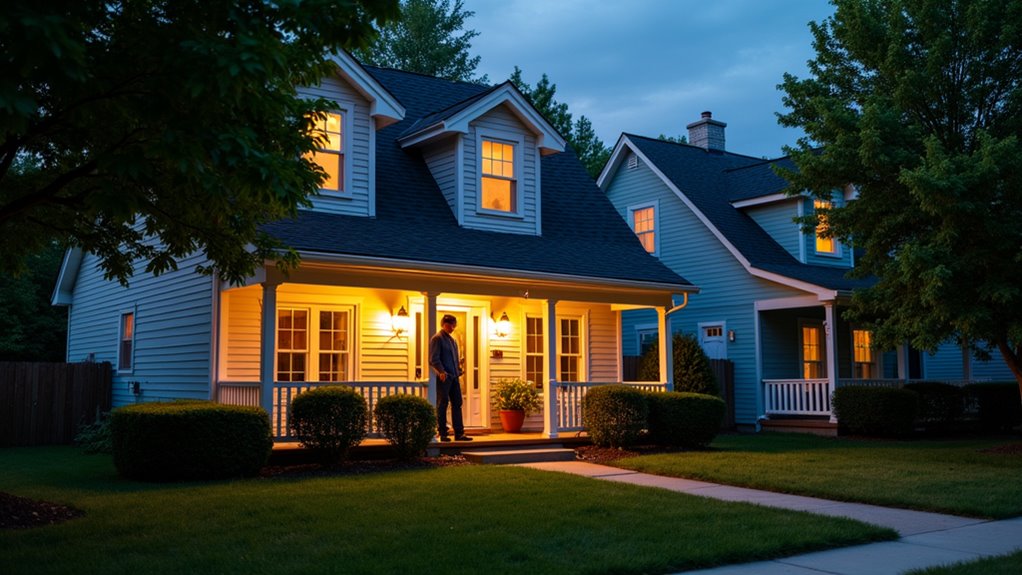
Installing security cameras requires following legal rules. This protects your property and your neighbors’ privacy.
First, make sure your cameras only capture images within your property lines. Focus them on areas like your front door or driveway. Avoid angles that invade your neighbors’ spaces. Don’t point cameras at their windows or backyards. They deserve privacy in those areas. It’s also important to be aware that privacy expectations can vary by state, influencing where you can place your cameras.
When placing cameras on fences near property lines, ensure they don’t record private conversations or activities from the other side. Avoid sensitive areas, like bathrooms or bedrooms. People expect privacy there. Additionally, surveillance should be limited to necessary security locations to avoid infringing on others’ privacy rights.
Check with your landlord or building management for specific rules, especially in apartments. Following these guidelines improves your security while respecting others’ privacy.
Audio Recording and Privacy Risks
Installing security cameras can make your home safer. But think about the risks of recording audio. Before recording sound, you need to consider consent. In Canada, recording without permission can cause legal troubles. Here’s what you need to know:
| Aspect | Requirement | Importance |
|---|---|---|
| Audio Consent | Get clear permission first | Stay within the law |
| Privacy Expectations | Do not record in private areas | Protect people’s privacy |
| Signage | Put up clear signs about audio recording | Keep visitors informed |
| Legal Framework | Follow PIPEDA and local laws | Safeguard personal info |
| Security Measures | Protect audio data storage | Stop unauthorized access |
To lower privacy risks, turn off audio recording unless you have consent. Always respect others’ privacy. This keeps you safe both legally and ethically. Additionally, understanding audio functionalities can help you make informed decisions about when and how to use your security cameras effectively. In addition, awareness of state-specific consent requirements is crucial when navigating the complexities of recording laws.
Business vs. Residential Camera Privacy Rules
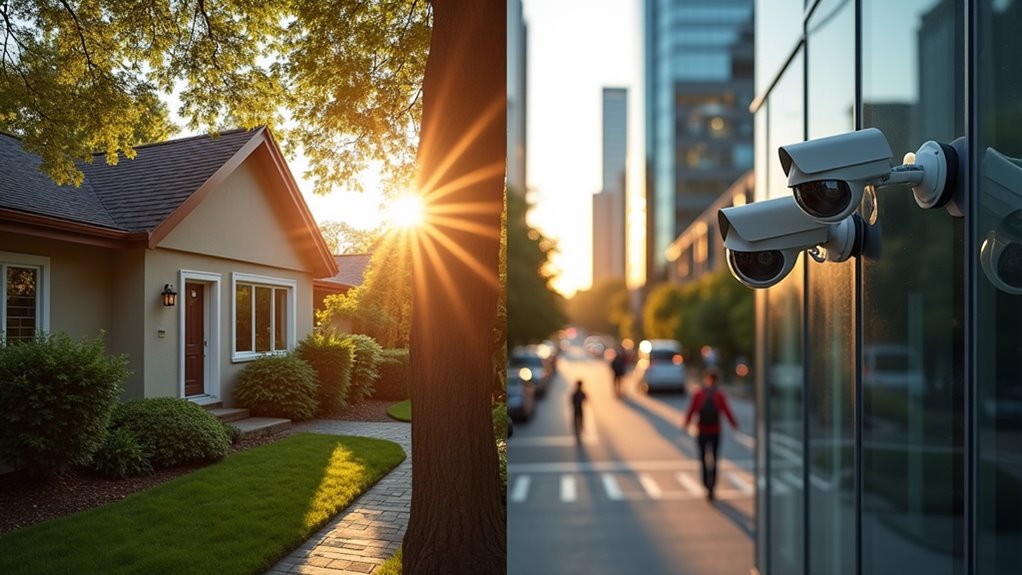
Businesses and homes benefit from security cameras. Yet, the privacy rules for each are different.
Businesses must get consent before collecting personal information. They should also inform customers and employees about the purpose of surveillance. Clear signs help with this. Additionally, PIPEDA applies to private sector organizations, ensuring that data collection is conducted with informed consent.
Residential rules are less strict. Homeowners don’t need formal consent. Still, they should respect privacy. Avoid capturing images of neighbors’ properties.
Businesses place cameras in areas that need security. They don’t put cameras in private spaces, like restrooms. Homeowners should ensure their cameras don’t record beyond their property line.
Both businesses and homeowners must handle recorded footage securely. Businesses follow stricter rules under PIPEDA.
Knowing these differences helps everyone follow privacy regulations. This understanding enhances security in both settings.
Conflict Resolution and Neighbourhood Privacy
Resolving conflicts about neighborhood privacy is key to keeping good relationships with neighbors. Start by talking openly about your security camera. Explain why you want it and listen to their worries. This helps build trust and avoid problems. Additionally, you should ensure that your use of cameras aligns with the Data Protection Act to avoid potential legal issues.
Drafting a privacy agreement can help too. This agreement can show where cameras will point and what areas are private. It sets clear rules and shows respect for everyone’s space. Additionally, be aware that CCTV monitoring must comply with privacy laws, which can influence how you position your cameras.
If talking doesn’t work, consider using mediation services. These services can help both sides find a solution. It’s important to work together to keep peace in the neighborhood.
Key Principles for Compliance
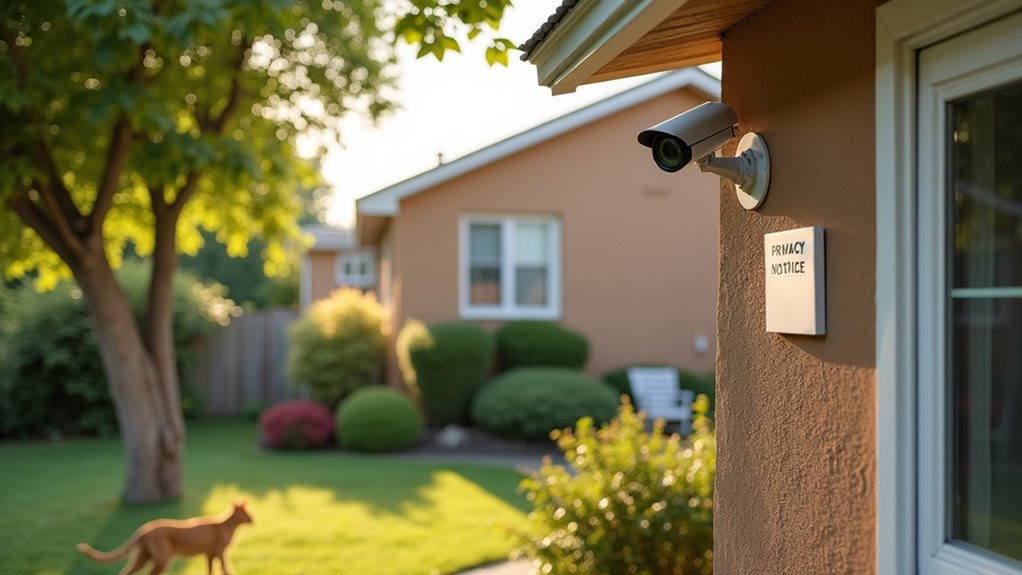
Installing a security camera at home requires following important rules to protect privacy. Knowing the laws about cameras is essential.
| Principle | Description | Importance |
|---|---|---|
| Consent Requirements | Get permission before filming. | This keeps you legal and respects privacy. |
| Proper Placement | Place cameras within your property. | This avoids capturing private areas. |
| Data Management | Keep footage safe and limit access. | This protects personal information. |
Always let people know about your cameras. Use clear signs to show where cameras are, as clear signage is a legal requirement for the usage of surveillance cameras. This helps everyone understand and respect privacy in shared spaces. Additionally, transparency with tenants about camera purpose and locations fosters a positive landlord-tenant relationship. By following these rules, you create a safe environment while respecting others’ rights.
Best Practices for Home Security Camera Use
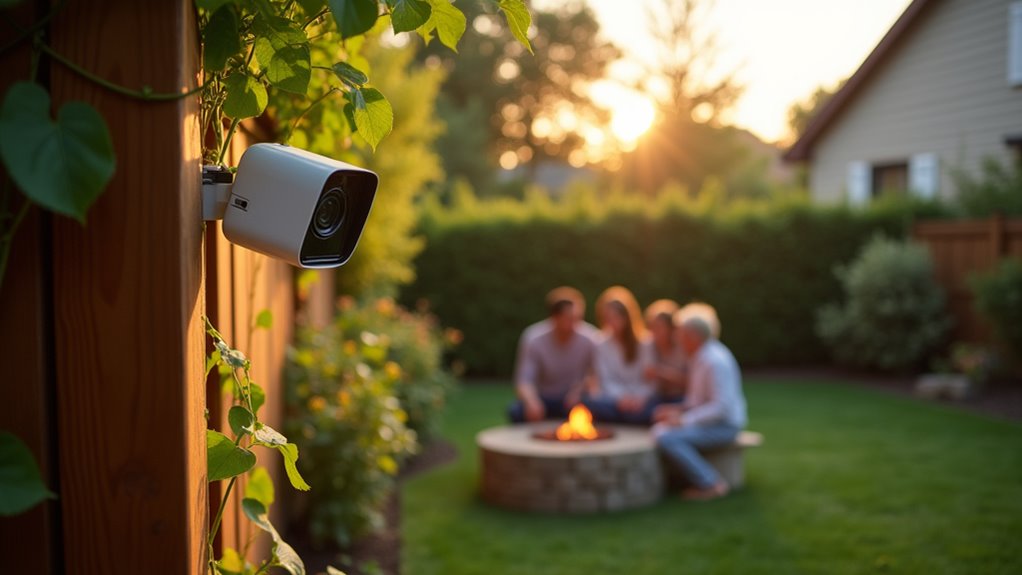
Using home security cameras well means following some key practices.
First, place cameras to watch your doors and yard. This helps keep an eye on your property without invading your neighbor’s space. Avoid angles that might catch their yard or windows.
Next, turn off audio recording. Canadian law says you need permission to record sound. Stick to just video. Show clear signs that cameras are recording. This tells visitors about the surveillance. It’s important to remember that security cameras must not violate reasonable expectations of privacy. Also, be aware that federal laws on audio recording can vary significantly, so understanding your local regulations is essential.
Keep your recorded videos safe. Limit access to trusted people only.
Check your camera settings often. By following these steps, you protect your home and respect others’ privacy. This helps create a safer neighborhood for everyone.
The Importance of Respecting Privacy Rights
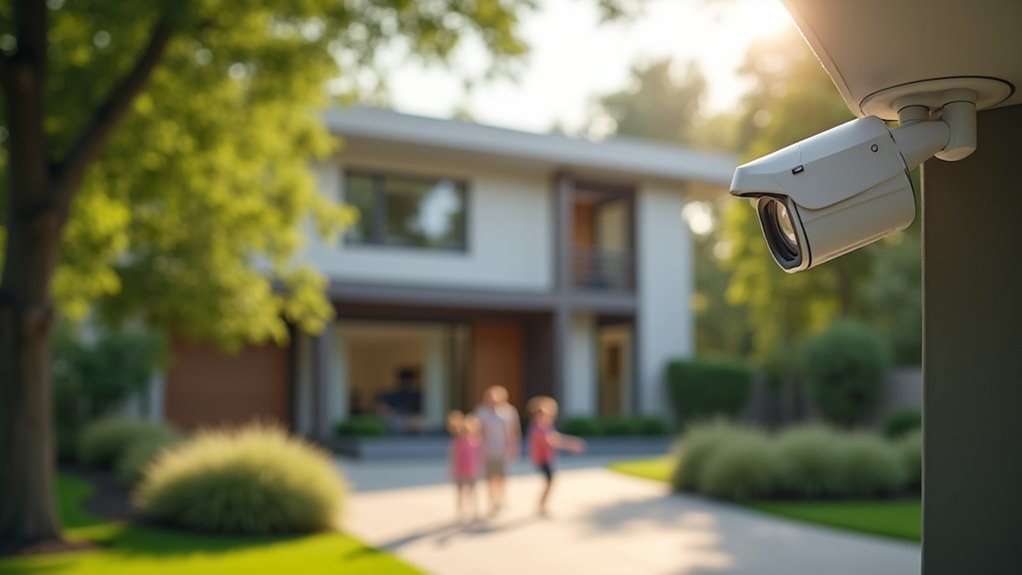
Respecting privacy rights is key to building trust in your community. It also helps keep your home safe. Understanding privacy laws is essential when using security cameras. This knowledge protects your neighbors while you monitor your property.
Always inform people about your surveillance. Use clear signs to show that cameras are recording. This practice builds trust and shows respect for their privacy.
Remember, recording audio without permission is usually not allowed. Consider turning off that feature on your cameras. Additionally, being aware of the lack of regulations for personal use can further guide your surveillance practices.
Limit camera recording to your property. Don’t capture public spaces or neighboring homes. This keeps you compliant with privacy laws.
Frequently Asked Questions
Can I Install Cameras in Common Areas of My Apartment Building?
Installing cameras in common areas of your apartment building needs permission. Talk to your landlord or property manager first. They can tell you the rules. It’s important to respect the privacy of other tenants.
Focus on placing cameras inside your own unit. This keeps your space secure. Make sure not to film others without their knowledge. Always prioritize safety and privacy for everyone in the building.
What Should I Do if My Camera Captures a Neighbor’s Property?
Your camera should focus only on your property. Adjust the angle to avoid capturing your neighbor’s space. This helps protect their privacy. Recording private areas can lead to legal issues. It may cause arguments or disputes too. Always respect your neighbor’s rights. Keep your recordings within your own boundaries. This way, you stay friendly and avoid problems.
Are There Specific Brands of Cameras That Comply With Canadian Privacy Laws?
A garden flourishes with flowers in harmony. Brands like Arlo and Nest provide cameras that respect privacy laws in Canada. Their features include options for controlling what you record.
Arlo cameras allow users to set privacy zones. This means you can choose which areas to monitor. Nest cameras also offer similar settings. You can adjust the camera’s view to protect your neighbors’ privacy.
Both brands follow Canadian privacy rules. They ensure that your home’s surveillance stays within legal limits. Take time to compare their settings. This way, you can feel confident that your camera choices respect privacy.
How Long Can I Legally Store Recorded Footage From My Security Cameras?
You can store recorded footage from your security cameras for about 30 days. This time frame follows many legal guidelines for footage retention. Different places may have their own rules. The purpose of the recordings can also affect how long you can keep them. Always check local laws to be sure. Storing footage helps with safety and security. It can also help in case of any disputes or incidents. Keeping records for the right amount of time is important.
Can I Use Cameras to Monitor My Children in Our Backyard?
You can definitely watch your kids in the backyard. It’s smart to keep an eye on them. Safety is important. But think about privacy too. Your backyard is a personal space. You want to respect that.
Using cameras can help you feel secure. Just make sure the cameras only cover your yard. Avoid pointing them at neighbors’ spaces. This keeps things friendly.
Talk to your kids about cameras. Explain why you use them. This builds trust and understanding.
Conclusion
Understanding Canada’s home security camera privacy rules is important for everyone. These rules help protect your home and your neighbors’ privacy.
Place cameras only on your property. Avoid pointing them at your neighbor’s yard or windows. This keeps everyone’s space respected.
Audio recording is also a serious matter. In Canada, recording conversations without consent is illegal. Make sure your cameras do not capture audio unless you have permission.
Know the difference between residential and business rules. Business locations have stricter requirements. They often need clear signs to inform people about cameras.
Following these guidelines helps you avoid legal problems. Respect privacy, and you create a safe space for all. Enjoy peace of mind knowing you are following the rules.






